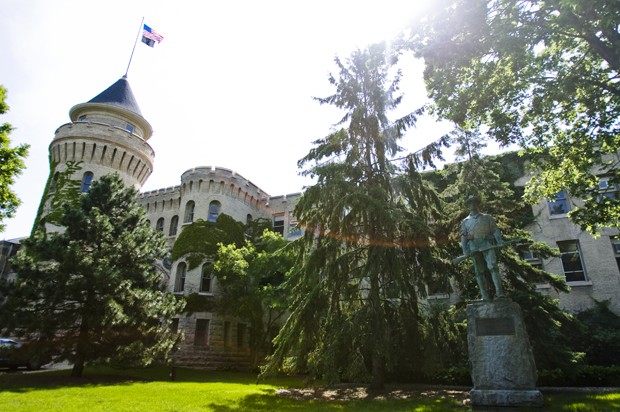For the first time ever in the United States, data is now available on the health needs of veterans attending post-secondary schools. University of Minnesota researchers are finding this data useful as they prepare for the expected influx of student veterans in August when the Post-9/11 GI Bill, which gives education benefits to individuals who served for at least 90 days after Sept. 11, 2001, takes effect. The University and the Minnesota State Colleges and Universities system conducted the survey, which is similar to Boynton Health Service âÄôs College Student Health Survey , but specifically for student veterans. The results of the 2008 survey were released on May 29 . The survey showed that in most areas, student veteransâÄô health needs were similar to the health needs of non-veterans students, with the exceptions of mental health, sexual assault and immunization. Boynton Director Ed Ehlinger said the idea for the study arose when researchers realized they didnâÄôt have any health data on student veterans. âÄúThe biggest surprise was that, in general, the veterans look just like a comparable set of non-veteran students,âÄù Ehlinger said, âÄúincluding the things where we thought they would be worse, for example we thought that alcohol use would be much higher in veterans.âÄù
PTSD and sexual assault high
The areas where student veterans had different results from non-veteran students: veterans are better immunized, they have higher levels of post-traumatic stress disorder (PTSD) and female veterans had a higher percentage of sexual assault in her lifetime compared to non-veteran females. The survey showed more female student veterans had a higher percentage of PTSD than male student veterans. Ehlinger said it could be possible because women are more often diagnosed with the disorder than men. âÄú[Women] will come in and get diagnosed and deal with the issue, whereas men often will ignore the issue,âÄù Ehlinger said. According to the U.S. Department of Veteran Affairs , 22 percent of female veterans tested positive for Military Sexual Trauma in 2007. Both men and women veterans can obtain sexual counseling through the local Veterans Affairs Medical CenterâÄôs Military Sexual Trauma coordinator . Services are also available at the Aurora Center on campus for anyone who has been affected by sexual assault. Jill Lipski Cain , the violence prevention education coordinator at the Aurora Center, said there is no data on how many student veterans use the Aurora Center because they donâÄôt keep those demographics. âÄúDefinitely itâÄôs a challenge to come forward, and I think that a lot female cadets and other women in the military are facing some pretty significant barriers and challenges with coming forward, much like other survivors,âÄù she said. There are about 362 self-reported student veterans on campus according to the survey . Ehlinger says he expects that number to increase because of the Post-9/11 GI Bill.
Transitioning
Chris Holbrook , 27, was a student at the University for a year before he went to Iraq and Afghanistan. He came home in August of 2006 and resumed his college career at the University. âÄúI knew that the University was a large, liberal school, and so being a veteran I was wondering, âÄòwhat am I going to experience, what am I going to go through?âÄôâÄù Holbrook said. âÄúBut since IâÄôve been home itâÄôs been great.âÄù Steve Biorn , 24, a student veteran who graduated in 2008, said he sacrificed a lot to get his education. He served with the National Guard in Iraq after high school, and came to the University in the summer of 2005. Both Holbrook and Biorn were not surprised that alcohol and marijuana use were not problems unique to veterans. âÄúWe drink a lot less than other students,âÄù Holbrook said. Holbrook said he did not personally experience PTSD, but he wants veterans to know there are lots of resources available on campus for them. Holbrook said he thinks the University has been accommodating of his transition from veteran to student. âÄúI was in some pretty intense situations,âÄù he said. âÄúBeing that IâÄôve been through the things that I did, I havenâÄôt found that IâÄôve been at a disadvantage.âÄù But in some cases, transitioning isnâÄôt always easy. âÄúItâÄôs kind of hard coming back and being twenty-something and taking freshman English with a bunch of eighteen-year-olds,âÄù Biorn said. To help make it easier, thereâÄôs a student group on campus, the Student Veterans Association. The SVA helps veterans integrate with other students on campus. Biorn was the vice president of the group when it was called the Veterans Transition Center . âÄúItâÄôs more of a social hangout than academically related,âÄù he said. Biorn said the SVA brings veterans together, but also teams them up with other student groups on campus. Holbrook is currently the communications director of the SVA. âÄúOur main goal is to get veterans to interact with other people,âÄù he said. Ehlinger said the survey is meant to help understand what the veterans need when they come to college. âÄúKnowing some of the health issues that theyâÄôre facing will allow us to help them better integrate into college life and then be much more successful in their college careers,âÄù he said. Ehlinger and his team have completed the 2009 survey and are in the process of analyzing the data. He said the results should be released in November.











